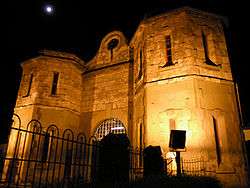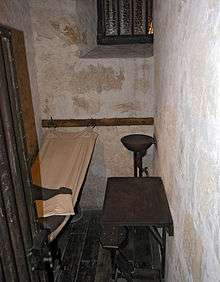Punishment in Australia
The Australian prison system is a part of the Australian criminal justice system. As of 2014, 51% of Australian prisoners were convicted of a violent crime. [1]
Life imprisonment in Australia
In Australia, life imprisonment is of indeterminate length. The sentencing judge usually sets a non-parole period after which the prisoner can apply for release under parole conditions, or in the case of a criminal who has committed particularly heinous crimes, the sentencing judge may order that the person is "never to be released".

Capital punishment in Australia
Capital punishment had been part of the legal system of Australia since British settlement and during the 19th century, crimes that could carry a death sentence included burglary, sheep stealing, forgery, sexual assaults, murder and manslaughter and there is one reported case of someone being executed for "being illegally at large" and during the 19th century, these crimes saw about 80 people hanged each year throughout Australia.
The death penalty was abolished in Queensland in 1922, Tasmania in 1968, the Commonwealth in 1973, Northern Territory in 1973, Victoria in 1975, South Australia in 1976, ACT in 1983, Western Australia in 1984, and New South Wales in 1985. It was finally abolished through federal law in 1973 with the Death Penalty Abolition Act 1973 of the Commonwealth abolished the death penalty for federal offences. It provided in Section 3 that the Act applied to any offence against a law of the Commonwealth, the Territories or under an Imperial Act, and in s. 4 that "[a] person is not liable to the punishment of death for any offence".
No executions were carried out under the bridge of the federal government and the passage of the Death Penalty Abolition Act 1973. Convicts saw the death penalty replaced with life imprisonment as their maximum punishment.
Private prisons
The following prisons in Australia are managed by private corporations.
- Fulham Correctional Centre
- Mount Gambier Prison
- Port Phillip Correctional Centre
- Arthur Gorrie Correctional Centre
- Parklea Correctional Centre
- Junee Correctional Centre
- Acacia Prison
Australia has a number of offshore prisons. The nine-year contract for the immigration detention facilities on Nauru and Manus Island are held by Transfield and sub-contractor Wilson Security. Wilson attracted controversy firstly when a Green Party senator was spied on during a visit to the detention centre;[2] later, one member of staff exposed alleged a culture of sexual harassment in the workplace.[3] Wilson is owned privately by the Kwok family of Hong Kong that also owns Sun Hung Kai Properties, the Hong Kong property developer with the highest market capitalisation.[4]
Prison museums

Former Australian prisons which are now open to the public as museums.
- Old Dubbo Gaol
- Boggo Road Gaol
- Fremantle Prison
- Fannie Bay Gaol
- Gladstone Gaol
- J Ward
- HM Prison Geelong
- Adelaide Gaol
- Mount Gambier Gaol
- Redruth Gaol
- Maitland Gaol
- Wentworth Gaol
- Old Melbourne Gaol
- HM Prison Beechworth
Former prisons
- HM Prison Beechworth
- HM Prison Fairlea
- HM Prison Geelong
- HM Prison Sale
- HM Prison Morwell River
- HM Prison Pentridge
See also
- Australian immigration detention facilities
- List of Australian psychiatric institutions
- List of Australian prisons and detention centres
References
- ↑ ABS, "Prisoner characteristics, Australia", http://www.abs.gov.au/AUSSTATS/abs@.nsf/DetailsPage/4517.02014?OpenDocument. (Aggregate of the categories: "Homicide and related offences", "Acts intended to cause injury", "Sexual assault and related offences", "Dangerous or negligent acts endangering persons", "Abduction, harassment and other offences against the person", "Robbery, extortion and related offences".)
- ↑ http://www.theguardian.com/australia-news/2015/aug/14/greens-call-for-wilson-security-ban-at-nauru-amid-claims-of-spying-on-senator
- ↑ http://www.theguardian.com/australia-news/2015/sep/10/former-nauru-wilson-security-guard-claims-sexual-harassment-of-staff-is-rife
- ↑ http://www.theguardian.com/australia-news/2015/sep/17/allegations-surround-wilson-securitys-link-to-hk-bribes-scandal-and-tax-haven